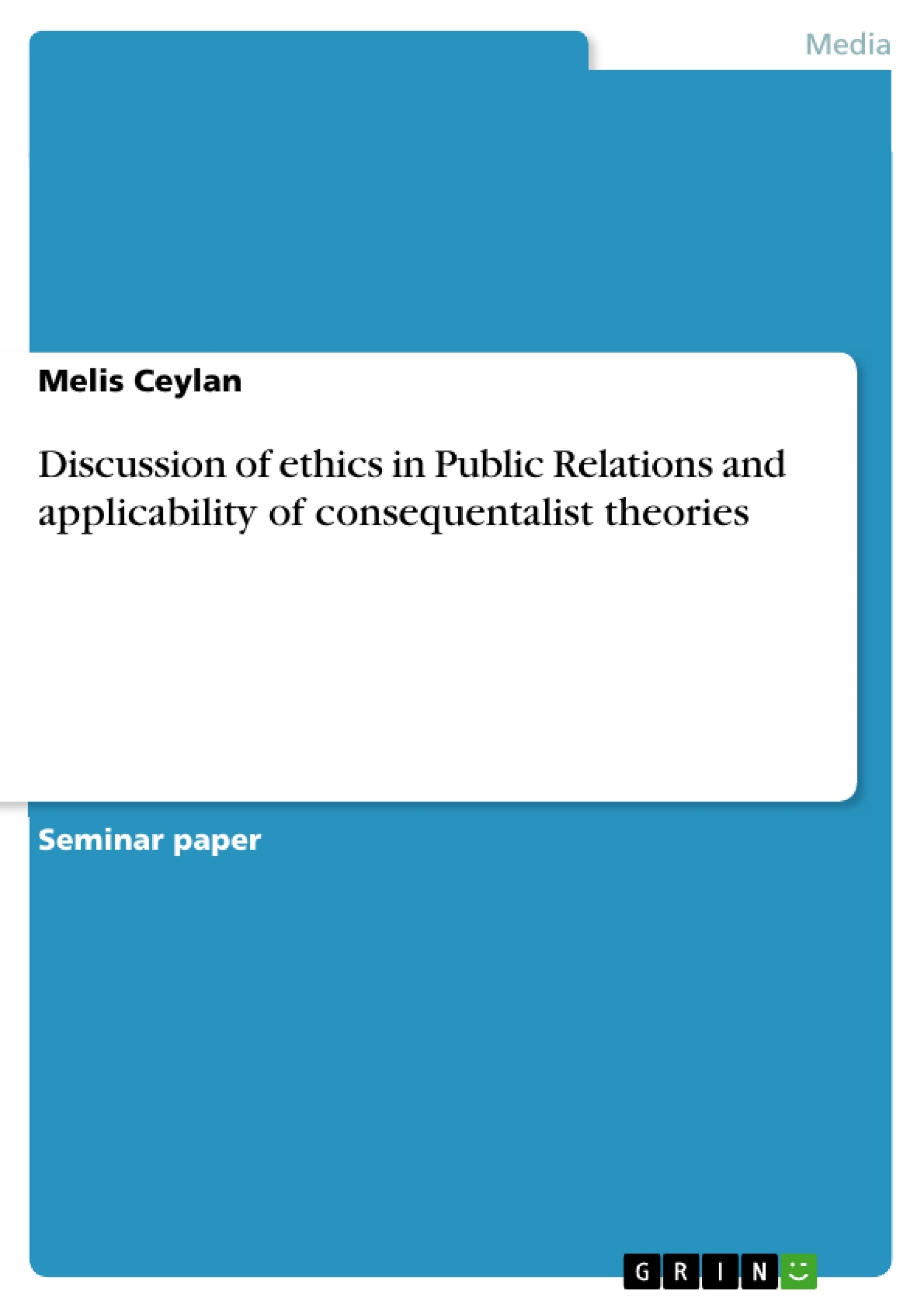Excerpt
INTRODUCTION
There are different kinds of theories which try to acquire a basis for ethical behaviour. Consequentialist theories are used in this essay as ethical theories for public relations. The best known consequentialist theory, utilitarianism, declares that actions of public relations practitioners must be judged by the usefulness they cause. This is also known as teleological approach, which means the study of ends.The opposite approach, deontological, focuses on the duty to respect other people’s rights (Tench and Yeomans, 2006).
Public relations ethics focuses on the ways which would help to overcome the problems of organisations within the public relations and communications (Parsons, 2004). According to Seitel (2001), public relations practitioners must consult with their clients in an ethical way. Public Relations Society of America (PRSA) has worked hard on building strong ethics mentality among its members.
This essay firstly introduces the role of public relations, practitioners’ aspects of social responsibility which enables to reach the organisational goals and the ethical media relations (Parsons, 2004). Further on, it is focused on the ethical dilemmas and decision making processes in order to discuss about whether PR practitioners make ethical decisions or not (Parsons, 2004). After this stage, teleological and deontological approaches are used to assess practitioners’ actions from utility or duty based aspects (Tench and Yeomans, 2006).
The Role of Public Relations and The Practitioners’ Aspect of Ethics
According to Tench and Yeomans (2006), Public Relations (PR) does not have one specific definition. In other words, there are some different ideas about PR which are commonly used by both the academics and practitioners. PR helps to sustain mutual communication between an organisation and its publics in order to be responsive to publics’ requests by the help of using research methods (Harlow, 1976:36 cited in Tench and Yeomans, 2006). Public Relation’s Role is explained under these headings by Parsons (2004):
Internal Relations: Trust and higher morale would be provided from the employees by educating them about ethics.
Client/Consumer Relations: Organisations would pursue programmes and take actions which would focus on mutual respect.
Media Relations: If the promises are kept in long run, the relationship will be improved.
According to Cottle (2003), there is a close link between public relations and news production. In the recent years, some ethical traps of dealing with the media have emanated (Seib and Fitszpatrick, 1995 cited in Tench and Yeomans, 2006). To deal ethically with the News Media, four components should be achieved. These are:
- Honesty and accuracy
- Knowing how and when to use the media
- Responsiveness
- Respect (Parsons, 2004 cited in Tench and Yeomans, 2006).
As Tench and Yeomans (2006) states, Public Relations is about building relationships and trust is the main requirement from the practitioners to be successful in these relationships because once it is broken, it is very difficult to repair it. Trust can be achieved through highly professional and ethical performances. As a result of reaching an higher ethical standard, personal favors and expensive gifts or other valuables should never be given to media representatives in order to influence their decisions (Wilcox, Ault, Agee and Cameron, 2000).When small favours turn to bribery, the process of ethical standards can suffer and cause tremendous loss (Bromley, 1993).
There is an assumption that the best way to maintain satisfying relationships is to be open. This leads to a flow of information in and out of the organisation. As a result, understanding one another can be achieved (Toth and Heath, 1992). In addition to this, a member should not spread delusive information or should take a quick action in order to correct it. It has been argued that a member of an organisation should conduct with the public interest and should behave fairly to them and also to the clients or employers. Some other issues were also pointed out by the PRSA in order to establish ethical conduct among an organisation’s members (Cutlip et al., 1994).
It is also argued that being totally open with the press and the public may not be a good ethics because PR professionals are proud of being loyal to the managers and the company after being included to discussions about competitive strategies (Brian, 1988 cited in Toth and Heath, 1992). For instance, 47% of the members of International Association of Business Communicators (IABC) responded to a survey in the way that they would act against their ethical issues rather than losing their jobs. Unfortunately, salary level, recognition from superiors and job security can be seen as more important for some of them (Wilcox et al., 2000).
Wilcox et al. (2000) mentions that professional communication should not just be related to ethical or legal issues, but also to sensitiveness to cultural views and values. Nonetheless, as noted by Parsons (2004), and as a result of being relationship-building business, PR, apparently has relationships with corporate ethics. There are many practitioners who strive to improve morally. However, there are also some that still do not place importance on this (Cutlip, Center and Broom, 1994). Unethical public relations strategy emanates when ethics is seen as window-dressing.
Putting social responsibility into practice as much as ethics is essential to gain success (Sriramesh and Vercic, 2003). It is argued by Heath (2001), that futurists believe that organisations are valued mostly according to their level of taking socially responsible actions rather than their developed products and services. They should collaborate even with their rivals in order to find solutions to social problems. From a survey of mass market consumers, which was done by Diagnostics Social and Market Research, it can be seen that even though there are not any expectations of consumers from the companies to solve the world’s problems, consumers show positive reactions towards the ones which behave socially responsible (White and Mazur, 1995).
[...]
- Quote paper
- Melis Ceylan (Author), 2007, Discussion of ethics in Public Relations and applicability of consequentalist theories, Munich, GRIN Verlag, https://www.grin.com/document/85742
Publish now - it's free






















Comments